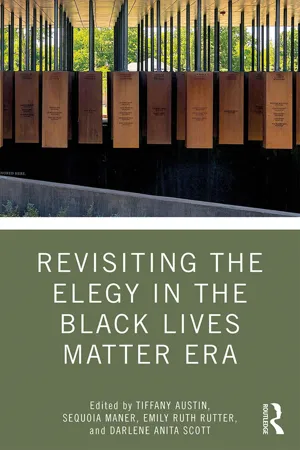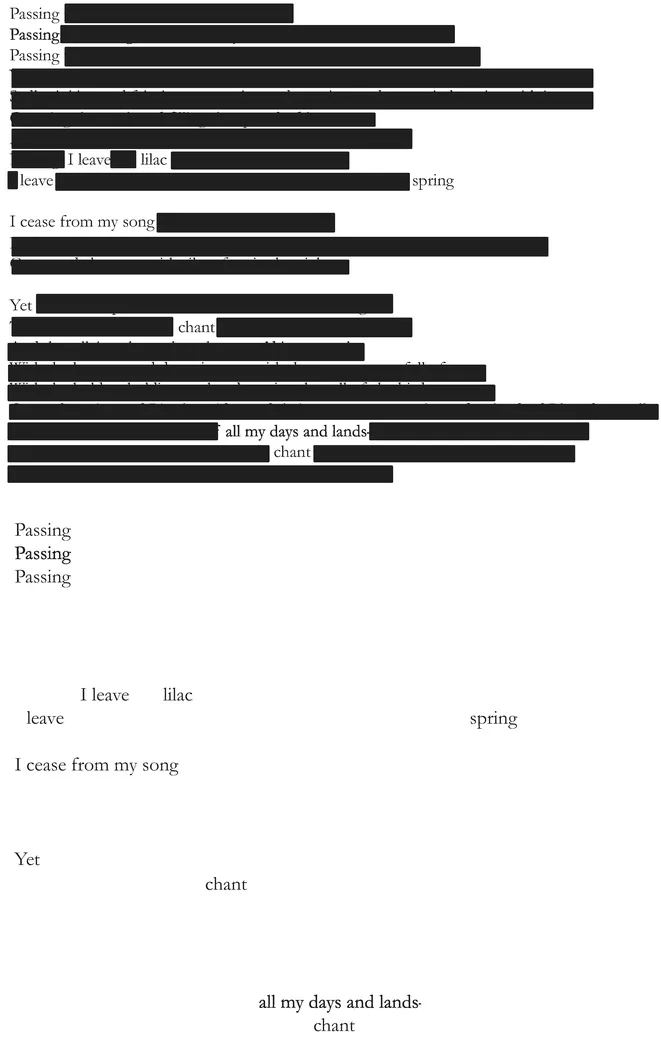
Revisiting the Elegy in the Black Lives Matter Era
- 282 pages
- English
- ePUB (mobile friendly)
- Available on iOS & Android
Revisiting the Elegy in the Black Lives Matter Era
About This Book
Revisiting the Elegy in the Black Lives Matter Era is an edited collection of critical essays and poetry that investigates contemporary elegy within the black diaspora. Scores of contemporary writers have turned to elegiac poetry and prose in order to militate against the white supremacist logic that has led to recent deaths of unarmed black men, women, and children. This volume combines scholarly and creative understandings of the elegy in order to discern how mourning feeds our political awareness in this dystopian time as writers attempt to see, hear, and say something in relation to the bodies of the dead as well as to living readers. Moreover, this book provides a model for how to productively interweave theoretical and deeply personal accounts to encourage discussions about art and activism that transgress disciplinary boundaries, as well as lines of race, gender, class, and nation.
Frequently asked questions
Information
PART I
Elegiac Reconfigurations
Tony Medina
Senryu for Trayvon Martin
Pockmarked holey
Bleeds in rain puddle
Hoodie hides
No blood, tears, or
Eyes shut by wet grass
Screams pierce night sky
A father’s stomach pits
My boy! My boy!
Shot through sky
Skittles like Roman candle bursts
Blood from open chest
Stars squint and stare
Raindrops glare in moonlight
Witnessing bloodletting
Mourning grass
Like wet face of boy
Screaming bloody murder
Gunpowder blinds / The eye of justice reckless / As a dumb vigilante
Silence of blood clouds
Night drizzle where wind
Whistles through hole in can
Empty bag of Skittles
Crushed can of iced tea
Last game with father
Rain chews night air
Gnaws at brown boy flesh
Grinning teeth of bullets
Rain stains brown boy’s
Back as blood pours from chest
Turning the green grass red
How blues is born
Rain falls steady on dead end
Street strewn with black body
Mama’s cries hang
On rain hooks ornamenting
Night wind’s grin
Blood petals pock
Grim face of grass like lotus
On rain slick back of black boy
Not enough lifetimes
To take back powder burn cries
To piece my boy back
Tony Medina
From the Crushed Voice Box of Freddie Gray
The Black Houdini
Who done it
Done it to him self
I handcuffed my own
Damn self
I threw myself
In the back of the patrol car
My hands shackled
Behind my back
Slaveship cargo
Ago
I am the Magic Negro
The Black Houdini
Who done it
Dooze it to him
Self him black self
See, Ma? No hands!
I snatched the pistol
From the white man’s
Mind
From the back of the
Patrol car—
Suck on dis, Houdini!
I grabs the gun
And shoot my
Self in the chest
Neo-colonial style
The autopsy report says
Damn—
Would’ve been easier
To walk on water
I bet you a quarter
He done shot himself
I am the Magic Negro—
Spineless—
I brokes my own spine
After hogtying myself
Into a pretzel even
Houdini who done it
Would envy
Only to turn myself
Into a human pinball
Rattling around
The steel gullet
Of a Negro pickup truck
Once reserved for newly-
Arrived Potato Famine
New York Irish drunks
Down on their luck—
Me—moi—
It is I who was
Othello—
Oh hell no—
Yes—me
The Magic Negro
The Black Houdini
Who done it—
Dooze it all the time
To him self
His own
Damned self
Angela Jackson-Brown
I Must Not Breathe
I must not ask questions. I must not breathe.
I must not move.
I must not breathe. I must not talk back.
I must be compliant. I must not breathe.
I must not film the cop.
I must not call family or friends. I must not breathe.
I must not put my hands up or down. I must not breathe.
I must cooperate. I must be docile.
I must stay in the car or get out, depending on the mood of the cop.
I must not breathe too loudly or too quietly.
I must only do what I am told even if what I am told to do goes against my
basic civil rights.
I must not breathe.
I must hope that the cop is having a good day.
I must hope that the cop is a “good cop.” I must hold my breath and not
breathe. I must not be suicidal.
I must not be angry. I must be civil.
I must be obedient.
I must grin and show all of my teeth.
I must shuffle and dance, but only on cue.
I must not get stopped but if I run,
I must be prepared to die.
I must be prepared to die.
Anne Lovering Rounds
American Diptych

Jerry Wemple
Nickel Rides
I.
maybe his father, was a young man down at the shore
amusement piers or the scruffy city lots over near
the wrong side of town, they used to call them nickel rides.
Steel boxes jacking up and down, bucking around,
make your back feel like it was worked over with crowbar,
your hips like they was smacked with a plank.
Back in my day, word was out about those nickel rides
on the Philly streets. I was in from the country, hard
down by the river and the woods, but even
I knew what was what. Saw clear enough that one day
while stretching my legs near the 30th Street station
waiting in between long-run trains, when the paddy wagon
pulled up and four cops jumped out, jumped a man I hardly
noticed, whacking him good with long sticks. I figured soon
enough that I needed to take a left, cross the street,
head up another, act like never saw nothing, especially
a side-vision glance of him being cuffed and dumped
in the back of the wagon for a nickel ride. That unit
screech-lurching down the street like the driver wanted
to bust the brakes and run out all the gas all at once.
II.
there’s a war on people. All wars have casualties, atrocities.
All wars have losers. Only some wars have winners. Tonight
I see Charm City up in flames. Orange tongues of fire taunt
us from brick buildings. The old people say it’s just as it was
back in the King riot, nearly fifty years ago. They say
the neighborhood ain’t changed much since those days.
We had one good store. Now it’s burnt. Kids too young to remember
Tupac let alone Reverend King dodge in and out of focus,
like they were spun off their own nickel rides, dazed from the experience.
Philly, Baltimore, D.C.—I’m not much for cities. But a twist of fate,
a change of luck, and I could’ve been. Missed being born in Baltimore,
city of my conception, by a few weeks or a month. I got a parcel of kin
buried in the German saint’s cemetery in the Manayunk section of Philly.
Generation or two before them it isn’t hard to fathom other blood kin,
all those years removed, being sold in an auction lot in swampy D.C.
Of course, there’s a war on despair, too, though not official
and having no spokesperson. It’s often erratic, explosive even,
but is long-going like the rest. Likewise, despair too is a concept,
and so needs a people enemy. And sometimes it’s them, but in the end it’s us.
Me, I avoid the nickel rides. I watch on my TV what’s happening
one hundred fifty miles downriver in slacked-jawed sorrow.
1
DENORMATIVIZING ELEGY
Table of contents
- Cover
- Half Title
- Series Title
- Title
- Copyright
- Dedication
- Contents
- List of Figures
- Acknowledgments
- Preface: "Where Will All That Beauty Go?": A Tribute to Poet-Scholar Tiffany Austin
- Introduction to Revisiting the Elegy in the Black Lives Matter Era
- PART I Elegiac Reconfigurations
- PART II Hauntings and Reckonings
- PART III Elegists as Activists
- Prompts for Further Discussion
- Appendix for Further Reading
- Contributors
- Index